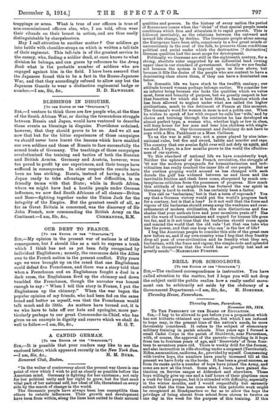A CANDID GERMAN.
[To TER EDITOR OF TR. " SIMCTATOR."1 Six,—It is possible that your readers may like to see the enclosed letter, which appeared recently in the New York Sun.
"In the welter of controversy about the present war there is one point of view which I wish to put as clearly as possible before the American mind. Germany is fighting for her existence ; not only for her political unity and her right to grow, but for that most vital part of her national self, her ideal of life, threatened on every aide by the march of change in the world. The Germanic people have always been less susceptible than others to outside influences. Their growth and development have been from within, along the lines best suited to their natural qualities and powers. In the history of every nation the period of florescence comes when the Geist' of that special people meets conditions which free and stimulate it to rapid growth. This is followed inevitably, as the relations between the outward and inward life change, by decline. The Germanic people alone among the Europeans have been able, consciously in a few great minds or unconsciously in the soul of the folk, to preserve those conditions political and social under which the destructive [? distinctive] German qualities had the most scope for development. Politically we Germans are still in the eighteenth century, for a strong, absolute ruler supported by an influential land owning upper class is our standard of government. Socially we are feudal not because the system is imposed upon us from above, but because it fills the desire of the people who are content to have a dominating class above them, if they can have a dominated one below.
In domestic life we have stuck to the twelfth century; our attitude toward woman perhaps belongs earlier. We consider her an inferior being because she lacks the qualities which we value most, force and tenacity of purpose, but we greatly respect in her that function for which she is best fitted, a function which she has been allowed to neglect under what are called the higher civilizations, much to the detriment of France at this moment. The German's word for women in mass is not a polite one. When he wishes to speak of her with respect he calls her 'wife,' and by choice and training through the centuries he has developed an almost perfect type, a woman who, whether high or low in class, will keep houso for her man and bear him children with single- hearted devotion. Our Government and Judiciary do not have to cope with a Mrs. Pankhurst or a Mme. Caillaux. To us the war is still war; not a game played by nice inter- national rules, but fire and sword, battle and murder and rape. The country that our armies fight over will not defy us again, and we shall, I hope, in a few months prove to the world the effective- ness of our system. To this standard of national life we have consistently kept. Neither the upheaval of the French revolution, the struggle of '48 nor the modern propaganda for humanitarianism and indi- vidualism has really touched the inner life of our people. But as the restless groping world around us has changed with each decade the gulf has widened between us and them and the inevitable friction and clash have come, sharpened by much con- temptuous criticism from the possessors of progress. How much this attitude of her neighbours has fostered the war spirit in Germany is hard to reckon. It has certainly been a factor.
You call us barbarians,' but is that a term of reproach P Yon say that a German victory would put the world's progress back for a century, but is that a loss P Is it not well that the force and vigour of the barbarian should sweep away the weakness and over- refinement of modern civilization, the nice distinctions and fine shades that your authors love and your moralists prate of P Has not the wave of humanitarianism and regard for human life gone too far, and is it not time that the barbarian should rouse again and remind the world that the old rule Let that one take who has the power, and that one keep who can' is the law of life P
I beg the American people to consider this side of the great case now before us, and if my own country wins I beg that they frankly drop all pose of over-civilization and be frankly what they are, barbarians, with the force and vigour, the simple code and splendid belief in themselves that the world has so greatly lost and so greatly needs."—Mextranazu FuRsTEN.


























































 Previous page
Previous page